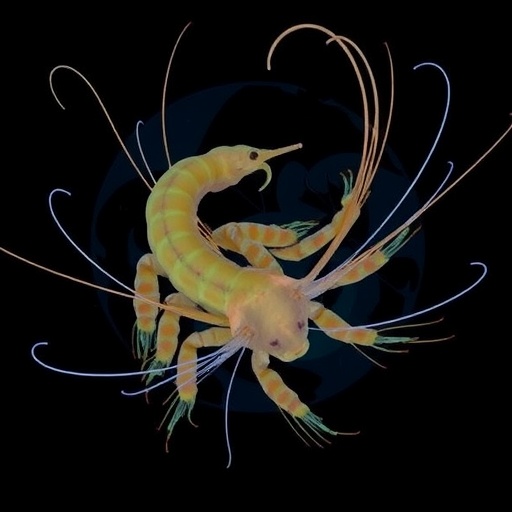In a groundbreaking study, researchers have developed a sophisticated species distribution model that focuses on benthic amphipod crustaceans residing in the deep North Atlantic Ocean, particularly in light of the pressing issues posed by climate change. This pivotal research, led by a team that includes Kürzel, Hammock, and Pitusi, aims to shed light on the future habitats of these crucial marine organisms and to offer insights that may guide conservation strategies in an era where environmental shifts are becoming increasingly pronounced.
The North Atlantic, rich in biodiversity and pivotal for various marine life forms, serves as a critical habitat for numerous benthic amphipods. These small, shrimp-like crustaceans play a significant role in the oceanic ecosystem, participating in the nutrient cycling of marine sediments and serving as a food source for various predators. The research team delved into the dynamics of these organisms, emphasizing their ecological importance and the potential impacts of climate change on their viability and distribution.
Climate change poses myriad threats to marine ecosystems, with rising temperatures and ocean acidification being among the foremost concerns. The research team employed advanced modeling techniques to predict how these factors may alter the habitats of amphipods in the deep North Atlantic over the coming decades. Their comprehensive analysis integrates a variety of environmental and climatic variables to assess possible future scenarios for these organisms under different climate change trajectories.
Utilizing historical data and recent climatic trends, the team applied machine learning algorithms to visualize future distributions of amphipods. This innovative approach allowed for the creation of a detailed map showcasing potential habitats for these species under varying climate scenarios. Such precision is paramount as it can guide future research efforts and shape policies aimed at mitigating the impacts of climate change on marine biodiversity.
The models reveal that many species of benthic amphipods may experience significant changes in their distribution as ocean temperatures continue to rise. In certain areas, populations may decline, while others may expand, forcing a reevaluation of existing marine conservation efforts. The research underscores the necessity for adaptive management strategies that are responsive to these biological shifts, ensuring that conservation measures are relevant and effective.
Through their study, Kürzel and colleagues identified specific regions that may serve as refuges for benthic amphipods in the face of climate change. By highlighting these crucial areas, the researchers provide valuable information to marine conservationists and policymakers, allowing them to focus their efforts on safeguarding key habitats that may support amphipod populations amidst environmental changes.
The implications of this research extend beyond the amphipods themselves; the findings contribute to a wider understanding of how climate-induced changes can ripple through marine ecosystems, affecting entire food webs. As primary consumers, amphipods play a vital role in maintaining the health and balance of their ecological communities. A disruption in their populations could have cascading effects on the various species that rely on them for sustenance.
Furthermore, the study’s use of species distribution modeling serves as a template for future research within the field of marine ecology. By refining and applying these modeling techniques to other species and regions, scientists can begin to build a more comprehensive picture of how marine life is shifting in response to climate change. This knowledge is essential for developing strategies that aim to preserve marine biodiversity across the globe.
The significance of this work lies not only in its contributions to scientific knowledge but also in its potential to galvanize public awareness regarding the threats posed by climate change to marine life. As the urgency to address environmental challenges escalates, research like this can serve as a catalyst for broader discussions about sustainability and conservation in oceanic ecosystems.
In conclusion, the study conducted by Kürzel and her team marks a crucial step forward in understanding the impacts of climate change on benthic amphipod crustaceans in the deep North Atlantic. The methodologies employed and the findings presented will undoubtedly spark further investigation into marine biodiversity, encouraging collaborative efforts among scientists, policymakers, and conservationists to navigate the challenges that lie ahead in protecting these vital ecosystems.
In light of the ongoing climate crisis, it is imperative that stakeholders utilize research-informed approaches to marine conservation, ensuring that efforts are both science-driven and adaptive to the evolving environmental landscape. The insights presented in this research provide a foundation for future studies and underscore the importance of continuously monitoring and modeling species distributions as climate conditions change.
Ultimately, this research reinforces the notion that every species plays a role in the intricate web of life that constitutes our planet’s ecosystems. By prioritizing studies like these that reveal and predict the nuances of species distribution, society can better prepare for the challenges posed by climate change and foster a more resilient marine environment for future generations.
Subject of Research: Benthic amphipod crustaceans in the deep North Atlantic under climate change.
Article Title: Species distribution modelling of benthic amphipod crustaceans in the deep North Atlantic under climate change.
Article References:
Kürzel, K., Hammock, C.P., Pitusi, V. et al. Species distribution modelling of benthic amphipod crustaceans in the deep North Atlantic under climate change.
Sci Rep 15, 39581 (2025). https://doi.org/10.1038/s41598-025-26442-x
Image Credits: AI Generated
DOI: https://doi.org/10.1038/s41598-025-26442-x
Keywords: Climate change, benthic amphipods, species distribution modeling, North Atlantic, marine conservation.




